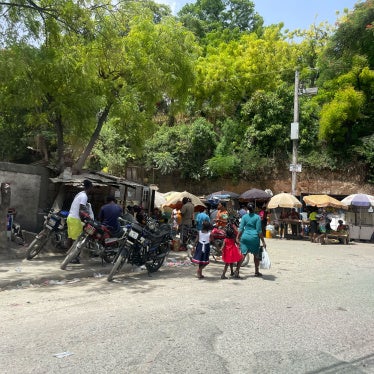U.S. and Mexican human rights groups today urged the Clinton administration to commit to seeking a remedy for widespread pregnancy-based sex discrimination in Mexico's maquiladora (export-processing) sector.
"We are extremely disappointed that the Mexican government remains unwilling to remedy sex discrimination in the hiring process, on the spurious ground that it is not technically illegal under Mexican labor law. However, we welcome the long overdue recognition that maquiladora operators discriminate against women and that the Mexican government is aware of this problem," commented LaShawn R. Jefferson, women's rights researcher for Human Rights Watch. Jefferson added, "We urge the U.S. Secretary of Labor to call on U.S. corporations operating in Mexico to cease these discriminatory practices, and we urge the Mexican government to reach an interpretation of the law that is consistent with its international obligations to remedy sex discrimination."
The complaint, filed on May 16, 1997 and based on a 1996 report by Human Rights Watch, alleged that Mexico is in violation of the nafta labor rights side agreement because, by failing to stop mandatory employment-related pregnancy testing in the maquiladoras, it fails to enforce its anti-discrimination labor law. The petitioners also alleged that Mexico denies victims of pregnancy testing access to impartial tribunals in which the sex discrimination can be resolved. This case was the first ever to come before the u.s. nao in which sex discrimination was alleged and access to appropriate labor tribunals was questioned. In response to the complaint, Mexico argued that pre-employment pregnancy screening does not violate Mexican law and that labor tribunals are barred from hearing complaints by people who are not employed, including women who are seeking jobs but who have not been hired.
The U.S. Labor Department report, issued on January 12, 1998, found that Mexico's Constitution and Federal Labor Code prohibit discrimination based on gender, and called for "ministerial consultations," a process through which U.S. Labor Secretary Alexis M. Herman will engage Mexico's Minister of Labor and Social Welfare, Javier Bonilla, to clarify the law and practices in Mexico on pre-employment pregnancy screening and post-hire discrimination on the basis of pregnancy.
According to the organizations that filed the complaint, the Labor Department report failed to take positions on the essential question of whether pre-employment pregnancy-screening violated Mexico's Federal Labor Code's prohibitions against sex discrimination. Similarly, they said the report did not address the Mexican government's assertion that job seekers should have no access to labor tribunals.
The consultation process has yet to be designed. The petitioners in the case urged that the ministerial consultation process be swift and transparent, and that the U.S. use the consultations to reach concrete results in the form of decisive action by the Mexican government to end hiring-process and on-the-job pregnancy-based sex discrimination. Jefferson urged, "The U.S. position going into these consultations should be unambiguous: pregnancy exams as a condition for employment are a form of illegal sex discrimination, whenever they occur. Every minute wasted discussing the possible legality of a patently illegal practice is a minute lost for women in Mexico facing sex discrimination."
Under nafta's labor rights side agreement, the signatories voluntarily agreed to have their own labor rights practices reviewed by the other nafta parties. To this end, the labor rights side agreement required each nafta signatory to create a National Administrative Office (nao) to analyze allegations of labor rights violations in the other parties' countries and to work with those countries to resolve problems identified. Should the consultation process not yield positive results, the U.S. may call for the convening of a meeting of experts.
Human Rights Watch is dedicated to protecting the human rights of people around the world. We stand with victims and activists to bring offenders to justice, to prevent discrimination, to uphold political freedom and to protect people from inhumane conduct in wartime. We investigate and expose human rights violations and hold abusers accountable.
We challenge governments and those holding power to end abusive practices and respect international human rights law. We enlist the public and the international community to support the cause of human rights for all. Kenneth Roth is the executive director and Jonathan Fanton is the chair of the board.
The International Labor Rights Fund (ilrf) is a nonprofit nongovernmental organization representing human rights, labor, religious, consumer, academic, and business groups dedicated to ensuring that all workers labor under humane conditions with adequate protection of basic worker rights. It was founded in 1986 and concentrates heavily on issues of workers' rights and international trade.
The National Association of Democratic Lawyers (Asociación Nacional de Abogados Democráticos, anad) is a network of legal professionals in Mexico committed to providing legal services, analysis and litigation in the defense of democracy and human rights. Its approximately 230 members include some of the most prestigious human rights authorities in Mexico, including noted specialists in labor law, arbitration, and collective bargaining.
For further information:
LaShawn R. Jefferson, Human Rights Watch
1-(202) 371 - 6599, x131
Joel Solomon, Human Rights Watch
1-(202) 371 - 6599, x128
Pharis Harvey, International Labor Rights Fund
1-(202) 347 - 4100, x1
María Estela Ríos, National Association of Democratic Lawyers
52 -5 - 588 - 0849








